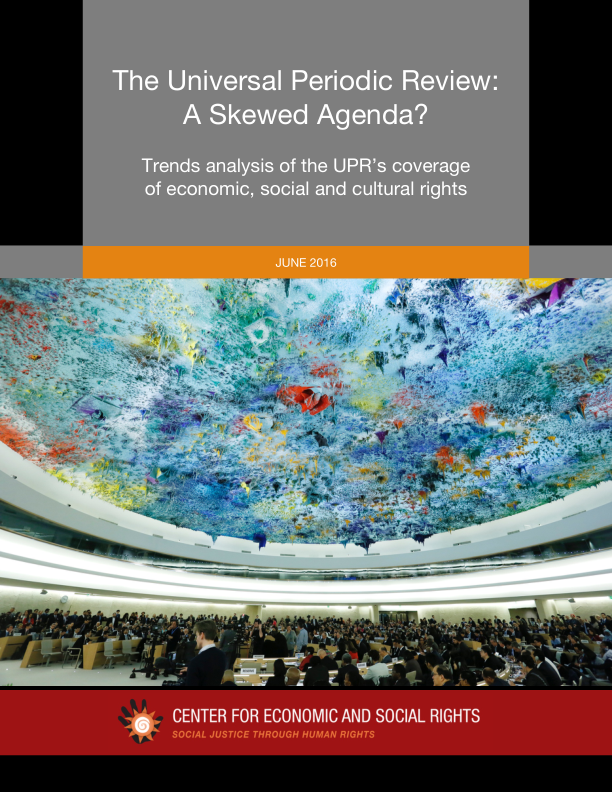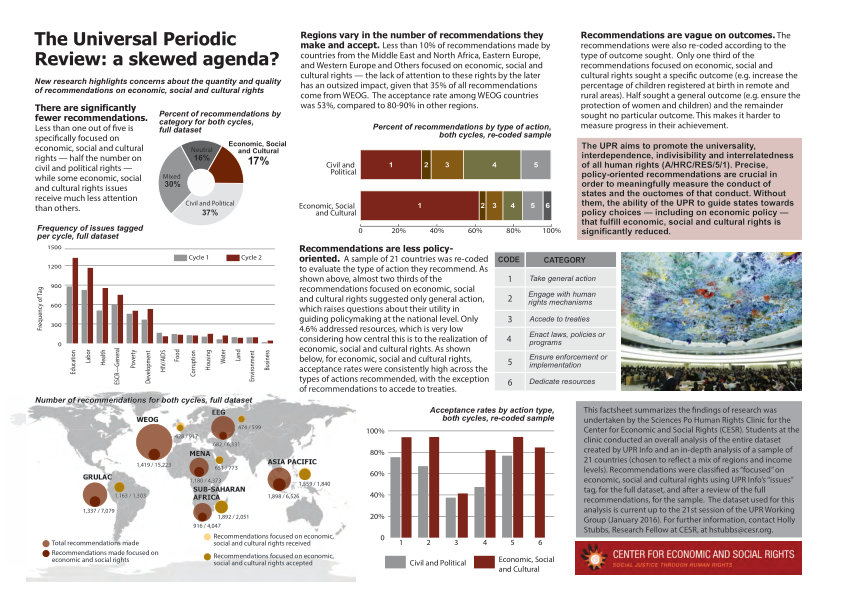Trends analysis reveals serious shortcomings in UPR’s coverage of economic and social rights
this briefing can de downloaded in pdf format here
The Human Rights Council’s Universal Periodic Review mechanism was set up to monitor states’ compliance will all categories of human rights equally. According to its founding resolution, the UPR aims to promote the universality, interdependence, indivisibility and interrelatedness of all human rights.
New research by CESR and the Sciences Po Human Rights Clinic has thrown light on some important shortcomings that have emerged since the body was established in 2006, however. Most notably, economic, social, and cultural rights (ESCR) appear to have been comparatively neglected in the Council’s reviews when compared to civil and political rights.
A quantitative trends analysis of the recommendations that have been made through the UPR shows that far less recommendations were made on ESCR issues, and that many of these recommendations were less precise in their specificity and detail.
Using UPR-Info’s database of the body’s recommendations from its inception to the 21st session in January 2016, the briefing also examines the proportion of ESCR-focused recommendations that have been accepted by states under review. It then digs deeper into a sample of 21 countries to assess the strength and clarity of the recommendations made. The research shows that, despite a rhetorical commitment to the indivisibility and interdependence of all human rights, ESCR have received much less attention at every stage of the entire UPR process.
Our analysis also shows that there is a high acceptance rate for recommendations focused on ESCR across most regions, suggesting that the UPR has significant but largely untapped potential to improve the realization of these rights. The briefing also includes recommendations on how to incorporate ‘SMART’ criteria into the ESCR-related recommendations issued by the UPR, so as to galvanize more effective accountability and, in turn, real progress on the ground.
These findings, echoed in the recent report to the Human Rights Council by the Special Rapporteur on Extreme Poverty and Human Rights, underscore the need to build the awareness and capacity of states and civil society organizations engaging in the UPR to craft more specific recommendations for how to operationalize their economic and social rights obligations. The provisions for shadow reporting, follow up and technical assistance under the UPR, as well as the periodic evaluations after each cycle, all provide significant opportunities for improvements to be made in this regard.
CESR and Sciences Po hope these findings will help prompt a broader dialogue among member states, UN bodies and human rights defenders on the role the UPR could play in advancing economic, social and cultural rights. As a unique and universal process with a significant degree of legitimacy and engagement on the part of states and civil society, advocating for the effective fulfilment of ESC rights through the UPR is an important means for redressing the comparative lack of attention that these rights still receive on the international human rights agenda.
- To download the briefing in pdf format, click here.
- Infographic: The Universal Periodic Review: a skewed agenda?
- Article: The Universal Periodic Review and economic, social and cultural rights: A skewed agenda? CESR Executive Director Ignacio Saiz writes for the International Service for Human Rights.

